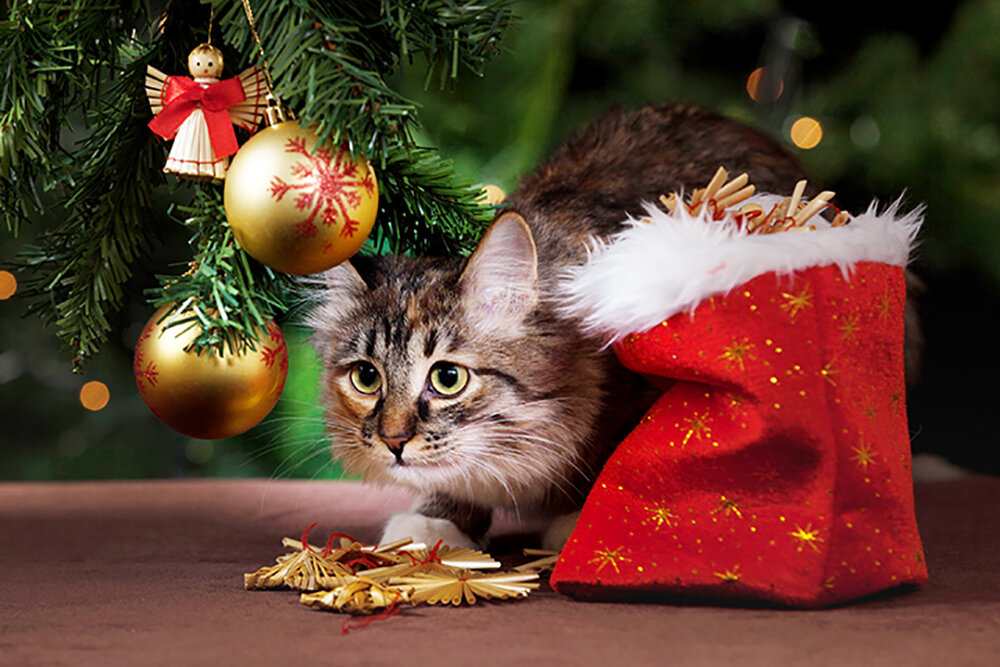10 ways to keep pets calm and safe in summer
Summer is back. Pool parties, family gatherings, holidays, the beach … good times are here. It’s also time to put plans in place for your furry family members for the inevitable changes to their comfy routines. Think tempting Christmas goodies, sweltering weather, holidays and noisy festivities.
Cats handle heat better than dogs. And if they feel uncomfortable about anything, they’ll instinctively move somewhere more pleasant, where many dogs won’t or can’t. Dogs need close supervision in summer.
Here’s 10 things to keep in mind to ensure a calm and safe summer for your pets.
1. Hydrate
Water is important in an Aussie summer. Have two full bowls accessible to your pet. Try leaving a large chunk of ice in the second bowl for a cool drink as it melts and consider using a refilling system if you are away all day.
2. Keep them cool
Dogs can’t strip down to shorts and turn on the aircon. It’s easy for them to overheat with their coats. We need to monitor the temperature for them.
Indoors is best. If there’s no air conditioning, close the blinds and keep the house as cool as possible.
Encourage your pet to chill out on a tiled surface. Tiles stay cool long after the house starts to warm up. A dog cooling mat (it absorbs body heat and is usually gel-filled with a tough cover) is perfect for your pet to lie on.
If your pet must be outside, they need adequate shaded shelter with plenty of water. A filled kids’ paddling pool in a shaded area is a great idea. Your dog can soak themselves to cool down.
Exercise
Most dogs will run themselves just as crazy on a stinking hot day if you don’t make sensible decisions for them. Exercise in the coolest part of the day and take it a little easier. Have plenty of water with you.
Extreme weather
If you are away for a long time on a scorching hot day, sending your dog to a family member or friend’s house is ideal.
Or, if you are lucky, you can take your pet to work with you!
If you don’t have willing sitters or a dog-friendly workplace, doggy daycare may be the best solution. In daycare, they are indoors in a cool environment, with other dogs, and supervised.
Hot cars
Don’t risk leaving your pet in a hot car, even for just a few minutes. If you have to stop somewhere your dog can’t come with you, plan your trip so they are left at home.
If you get caught out in your planning, leave your dog tied up outside in a shady spot where you can see it for as shorter time as possible.
Scorching ground
Dogs have naked feet that will get burnt by hot pavement, searing sand and anywhere else where heat (or sharp, jagged terrain) is likely. Sometimes those of us with footwear forget.
Hold the back of your hand on the surface for 30 seconds. If it’s not comfortable for you, it’s not safe for your dog to walk on.
Squishy-faced pets
It’s easy for squishy-faced (brachycephalic) pets to overheat. For dogs, think Boxers, Bulldogs, Mastiffs and Pugs to name a few. For cats, we are talking Persian or Himalayan.
These breeds normally struggle to breathe well. Excessive tissue around the nose and mouth can make breathing in hot weather very challenging.
Pay extra attention to your squishy-faced pet in summer and be mindful that heat is not ideal for them. Keep them indoors and well hydrated. Exercise at a cool time of day and keep it low key.
3. Pet-proof the Xmas Tree
Your pet might be mesmerised by the shiny baubles and twinkly lights, wanting to play endlessly, or they will barely register that the tree is there.
Observe your pet’s initial reactions closely and cross your fingers they don’t care. If your pet decides it’s of special interest, you may need to put up a guard or redesign your tree to avoid frustration and accidents.
Important fact: pine trees are toxic to cats. And tree needles are not good for the lining of your pet’s stomach. Pick up loose needles as soon as they hit the floor. Or play it safe and stick with a securely fortified fake tree.
4. Guard the Xmas goodies
Keep the human food well out of reach of opportunists. Let your guests know that feeding the dog from the table is out of bounds. They must ask your permission.
Fatty foods can cause weight issues, diarrhoea and even pancreatitis, cooked bones can fracture in the gut and get stuck, and sugary stuff is simply unsuitable for your pet’s digestive system.
Ideal Xmas treats for your fur babies might be small amounts of low-fat meat (no cooked bones) and vegies. Don’t give your pets sweeties! In short, resist the urge to splurge with your furry buddies and stick to their normal diet.
5. Set up a calm space
A sudden flurry of new sounds and smells in your home can freak animals out. They won’t know what the booming music or explosive fireworks is.
Make sure your pets have their own safe space away from the chaos. It might be a special room or bed in a quieter area.
Consider over the counter calming medication if raucous parties or summer thunder storms are likely to bother your pet. Look for plug ins and diffusers that emit calming pheromones.
6. Supervise water play
Most dogs know how to swim instinctively. They are much more likely to drown from physical exhaustion if there’s no way to get out of the water.
Cats can swim but most prefer not to. If they do end up in the water, they are nimble enough to climb out of most tricky situations.
And, yes, mouth to mouth pet resuscitation is actually a thing, but let’s not go there if we don’t have to. Always monitor your pets around water.
Patrol the pool
Have your pool properly fenced and keep the gate shut at all times.
Make sure there’s an easy way for your pet to get out of the pool. Depending on the strength of your dog, they could tire of swimming in as little as 5 minutes.
Show your dog where the pool steps are but don’t rely on this. Put a grippy surface on the steps and around the edge of the pool so they have more chance of getting out anywhere.
Swallowing chlorinated water is the biggest issue and it can make your dog sick. If ingested in large amounts, you’ll need to take an emergency trip to the vet.
Your pet’s safety around deep water is never guaranteed, so closely supervise at all times.
Pay attention at the beach
Off-lead dog beaches are a nice idea but the reality can be stressful. Excitable, off-lead dogs mixing together with a wide variety of personalities, plus owners who may not be supervising properly, can equal trouble.
If your dog is still a puppy or anxious and meek by nature, off-lead beaches may not be for them. On the other hand, it can be great fun for confident, outgoing, social dogs.
Learn your pet’s unique signs of happy or anxious behaviour. If you see early signs of stress, leave the beach. Pay attention to what’s going on at all times.
Thirsty dogs don’t know that drinking salt water will make them sick. It’s up to you to be on the lookout and stop them doing it.
Know your rivers & creeks
Fresh water lakes are the best place for dogs to swim. But most of us have to settle for the local river or creek.
Don’t let your dog play in still, rancid water. Make sure you bath them afterwards and don’t let them drink it!
Dogs on boats
There’s always the chance your dog will fall off your boat. Have a doggy lifejacket on board for when conditions are not ideal or you are far from shore. Get your dog used to wearing it as a puppy.
Keep in mind that dogs get seasick too! There is seasickness medication available specifically for dogs.
7. Be in control in the bush
Put your dog on a lead and closely supervise to protect the wildlife and steer clear of snakes and other nasties.
The bush is a stimulating environment with different smells and sounds. Your dog might feel anxious in an unfamiliar place like a campsite. Bring their favourite toys and treats on the holiday. If your dog needs more support, look into a special collar that releases synthetic calming pheromones.
At night, have them in the caravan or tent with the family if you can.
8. Watch out for critters
Snakes are always a worry in summer. It’s up to you to restrict where your dog goes and what they explore.
Teach your dog from a young pup to leave things alone and move away on the first command. Choose a short, repeatable phrase like ‘leave it’ and use it sternly from the outset. Reward your young dog when they obey.
There are ticks in grassy and bushland areas of regional Victoria. Put your dog on good quality tick prevention medication before you leave for your trip and have pet-safe bug repellent on hand.
9. Pets get sunburn too
White-haired pets need protection from the sun, particularly around the ears, eyelids and nose. Use a good pet-safe sunscreen.
Some cats will let you apply it and keep it on. Others will rub it off at the first opportunity. Bottom line, if you own a white cat, keep it indoors. Cats are more likely to get burnt than dogs because they are sun bakers and are therefore more prone to skin cancers.
Dogs are more open to the idea of sunscreen. Those with exposed skin or that have experienced hair loss should use it.
10. Be prepared for emergencies
Plan ahead for any unexpected events over the summer holidays. Your pet is a family member that needs consideration too.
Dehydration
Make sure you pet can access plenty of water. Signs that they are not getting enough: a dry nose, a sticky, rubbery gumline, and skin that doesn’t snap back into place when grabbed.
Heat stroke
Be on the lookout for excessive panting, sweating from paw pads, shaking, and, in extreme cases, vomiting, convulsions and passing out.
If your dog is showing early signs of heat stress, don’t cool them down too rapidly. Do it gently using a cooling mat or jacket and a fan. Offer plenty of water.
If your dog is showing advanced signs of heat stroke (vomiting, seizures or fainting), take them to the vet immediately.
First aid
Pack a doggy first aid kit for your trip: pressure immobilisation bandages, eye wash or saline, doggy antihistamines, and your emergency vet’s phone number.
The usual rules apply for snake bites. Take note of the colour and patterns of the snake (the vet needs to know), apply a pressure immobilisation bandage to the bitten area, keep your pet calm, and carry them to a vet hospital.
Have fun!
We hope these tips help you plan a calm and safe summer with your pets. Be organised and think ahead so you can relax and have fun with your furry family members while you are on holidays.



